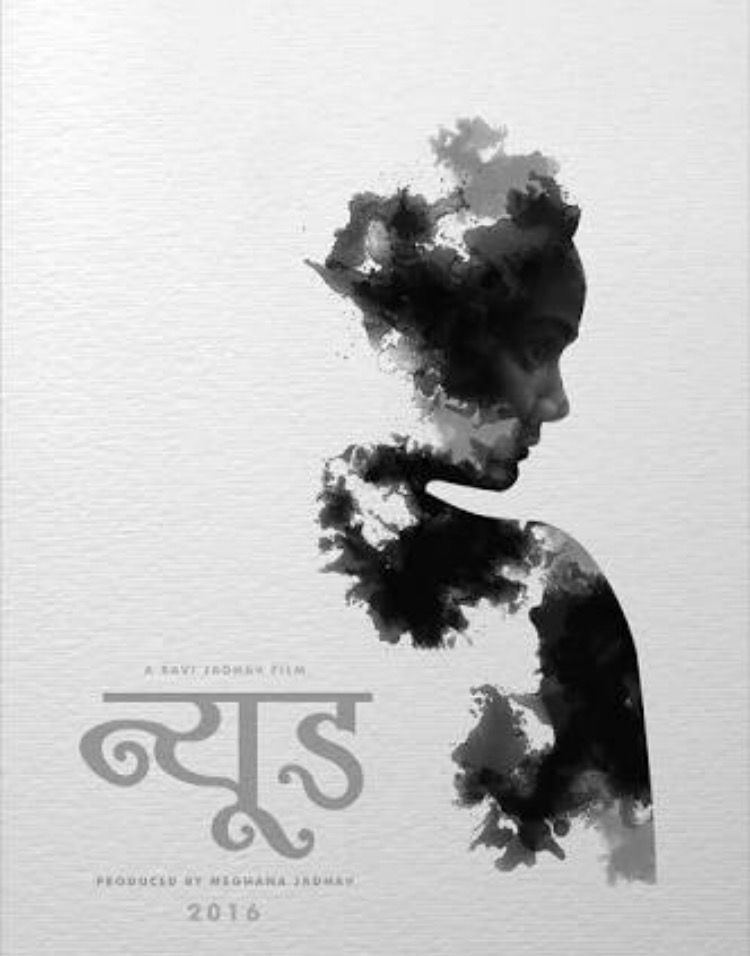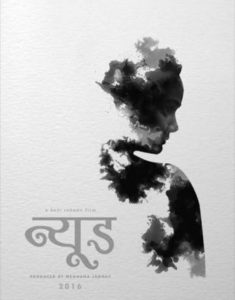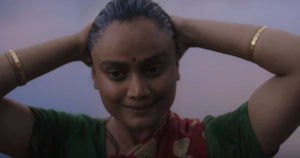
DFW SAFF 2019 Film Review “Nude: Chitraa”
WATCH THE TRAILER HERE
First, the Recap:
To go against everything you’ve known, everything you’ve put your faith towards, whether personally or societally, can not only seem overtly intimidating, but foolish and untrustworthy when it comes to assessing a future path to fulfillment. If we find ourselves under extreme circumstance and unforeseen difficulty, however, it is sometimes those moments of unexpected revelation that can break us free from our fears and show us a new level of freedom we never deemed possible. Still, moving forward in it may or may not lead to the liberation of soul we think it will. For one young woman named Yamuna (Kalyanee Mulay), existence has been a struggle with repression, tradition, and a highly abusive husband, Pahilwan, she has tolerated for too long.
Finally choosing to flee the situation with her son in two, Yamuna heads to Mumbai and moves them into her aunt Chandra (Chhaya Kadam), whom she calls “Akka”. Beaten and emotionally empty, Yamuna has a hard time getting on her feet until one day following Akka to the art school where she seemingly only sweeps until a hard reality for Yamuna to accept is revealed–Akka poses nude for art students as well. Shocked and disgusted, it take everything Akka can muster to explain to Yamuna that it has nothing to do with lust or sex, but rather being a project for the students to work with. Still hesitant, Yamuna ends up embarking on her own experiences as a model, and in doing so finds a release in soul, free of shame, and worthwhile in achievement. However, can it be enough to wipe away the past’s dark stains?
Next, my Mind:
Making a huge splash for this critic at the 2019 Dallas Fort Worth South Asian Film Festival sponsored by Toyota USA, the previous rumblings I had heard about the splendid quality and provocative controversary stirred up by this indie feature effort from director Ravi Jadhav and writer Sachin Kundalkar had me waiting to witness what it was all about. Suffice it to say, I was ecstatically blown away by one of THE BEST pieces of arthouse/indie cinema I have seen from the Indian/South Asian filmmaking community to date. There wasn’t an aspect of this film that didn’t capture my attention completely, and that is saying a lot coming from a critic who freely admits not always being able to astutely entertain full notions about the technical side of things when it comes to production value assessment. Here, however, the beautiful fluidity and artistically created cinematography absolutely embraces the characters and their journeys with a purposeful focus that makes it pop off the screen.
The general visuals provide atmospheres both wonderfully elegant and evocative to tangibly intense and jarring in following a narrative that provides us with the deeply emotional plight of one abused woman’s life getting utterly turned on its head and taken in a direction she would not have ever considered, as the very nature of it seems to fly in the face of every cultural norm she’s been infused with, much less seeing it initially as one more way society is attempting to overtly objectify women. Those who have read previous reviews I’ve done of films involving nudity, usually I convey how much I never truly feel its a necessary element to include, as let’s be honest, more often than not, it’s just plain gratuitous, with no actual bearing (forgive the almost pun, please) on the story. But, for possibly the first time I have ever admitted, the nudity here, already uncommon in most Indian cinema, is not at all unjustified, but an honest to goodness needed component that enhances the story and is certainly by far asexual as it gets. It represents a major victory for Yamuna’s character, symbolizing such undisguised extrication from the smothering societal norms she lived under.
Again, this isn’t to place any sense of total abhorrence against traditions in a given culture as much as just to make it more clear that overall, people should at least be free to have their own mind, make their own determinations about what they feel is right and true for them, and at least know that their moral center is still intact as long as it isn’t something so obviously negative in its nature that it would lead to harming others or trying to dominate the masses with our ideologies. The hesitations and initial disdain felt by Yamuna upon learning what Akka was up to is completely understandable as there’s no comprehension of it yet. Once that is made known, it alters her perception of it and becomes the means by which she takes her own leap to finally have a sense of worth and purpose in helping her son and others, seeking admiration and respect from the former and achieving it from the latter. I will say, though, that given this experience she encounters and lives for a good period of time, it only makes the film’s gut-punch finale that much more visceral, even as we then get to see exactly how all her best intentions have culminated into the effects it has on those closest to her, whether for good or ill, remaining to be revealed or left to conjecture.
I could clearly see why, and this is among having seen a myriad of excellent, top-notch performances throughout DFW SAFF 2019, Mulay ended up winning this year’s first annual award for Best Actress at the closing night event for her role as Yamuna, a fiery yet emotionally and physically exhausted woman who’s chosen to conclusively remove herself and her son from a frighteningly merciless marrige and home. Upon their arrival in Mumbai to make a new start with her aunt, things don’t initially improve, and desperation sets in. Secretly following her Akka to the job she’s mentioned before, it turns into a revelatory series of moments that sends her path into a decidedly different direction, yet becomes the release and freedom from her previous shame. However, she does also come to a sobering comprehension of exactly how non-understanding the surrounding society is, with its sometimes violent outrage at things they refuse to accept, while also trying to handle her rebellious son who soon seems to use her more than love her, a reflection of his former father. Whether it all ends up too much for Yamuna to control while trying to pass along to other young women the lessons she taken from her experiences is one roller coaster ride of emotionally draining yet impactful substance, with Mulay performing it with raw, believable, tangible intensity.
Primary supporting roles start with a earnest performance from Kadam as Yamuna’s aunt, Chandra (aka: Akka) who takes in her wayward relative and forces her to stop being a victim and instead be willing to not just stand up for herself, but to shed the ideas of inhibition and subdued attitudes the world around them tries to teach her and instead embrace a freedom unlike anything before. Watching as she partners with Yamuna during the journey is heartwarming and needed, and as Yamuna’s confidence grows, the two women bond even more. Then we have a seriously vigorous portrayal by Madan Deodhar as Yamuna’s son Lahanya, a boy desperately trying to establish his own identity while drawing farther and farther away from his mother, who is doing everything she is in order to support his dreams of schooling and a future, even though he remains unaware of how she’s making it happen financially for him. Yet, he still becomes more like his father, rejecting her love and simply wanting more and more from her, and the rift is causes is quite heartbreaking, leading to his part to play in the film’s final act that puts everything into harsh perspective. Additional turns come from Om Bhutkar, Neha Joshi, Kishore Kadam, and Shrikant Yadav, with a special appearance by the legendary veteran actor Naseeruddin Shah, who makes his presence felt even with abbreviated screen time.
In total, “Nude” shall forever remain, as already commented about above but worth repeating, one of the most astute examples of what indie cinema across any genre can accomplish with its deeply engaging characters, thought-provoking themes, and superbly executed style that defines the excellence found in the community of filmmakers it represents and should be a further reminder that talent doesn’t have to only be restricted to Hollywood blockbusters. More often than not, it’s actually found in efforts like this, and may that become a new norm we can all get on board with as time moves forward.
As always, this is all for your consideration and comment. Until next time, thank you for reading!





